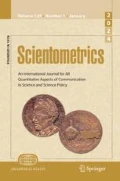Abstract
The generalized (also called extended) transfer principles as introduced in two earlier papers by Egghe and Rousseau are known to be stronger properties than the classical transfer principle of Dalton. Hence, functions satisfying one of these generalized principles are very good concentration measures. This paper studies the following non-trivial problem: how many different generalized transfer principles can a function satisfy? We show that a function can, at most, satisfy one generalized transfer principle. This also shows that a further generalization of transfer principles, comprising the generalized ones, is not possible. The proof of this result involves the solution of a norm problem in mathematical analysis and analytical geometry.
Similar content being viewed by others
References
P.D. Allison, Measures of inequality,American Sociological Review, 43 (1978) 865–880.
P.D. Allison, Inequality and scientific productivity,Social Studies of Science, 10 (1980) 163–179.
A.B. Atkinson, On the measurement of inequality,Journal of Economic Theory, 2 (1970) 244–263.
I.D. Chapman, C. Farina, Concentration of resources: the National Research Council's (Canada) grants in aid of research: 1964–1974,Scientometrics, 4 (1982) 105–117.
S. Cole, The hierarchy of the sciences,American Journal of Sociology, 89 (1983) 111–139.
H. Dalton, The measurement of the inequality of incomes,Economic Journal, 30 (1920) 248–361.
L. Egghe, Pratt's measure for some bibliometric distributions and its relation with the 80/20 rule,Journal of the American Society for Information Science, 38 (1987) 288–297.
L. Egghe, R. Rousseau, Elements of concentration theory,Proceedings of the 2nd International Conference on Bibliometrics, Scientometrics and Informetrics, London, (Canada), 1989, Elsevier, Amsterdam (1990) p. 97–137.
L. Egghe, R. Rousseau, Transfer principles and a classification of concentration measures.Journal of the American Society for Information Science, 42 (1991) 479–489.
C. Gini, Il diverso accrescimento della classi sociali e la concentrazione della ricchezza,Giornale degli Economisti, Serie 11 (1909) 37.
M.H. Heine, Indices of literature dispersion based on qualitative attributes,Journal of Documentation, 34 (1978) 175–188.
R.L. Johnson, Measures of vocabulary diversity. In: Advances in Computer-Aided Literary and Linguistic Research,D.E. Ager, F.E. Knowles, J. Smith (Eds), Birmingham, AMLC 1979, p. 213–227.
A.D. Pratt, A measure of class concentration in bibliometrics,Journal of the American Society for Information Science, 28 (1977) 285–292.
J.L. Ray, J.D. Singer, Measuring the concentration of power in the international system,Sociological Methods and Research, 1 (1973) 403–437.
H. Theil,Economics and Information Theory, Rand McNally, Chicago, 1967.
Author information
Authors and Affiliations
Rights and permissions
About this article
Cite this article
Egghe, L. Generalized transfer principles in econometrics and informetrics. Scientometrics 25, 167–191 (1992). https://doi.org/10.1007/BF02016853
Received:
Issue Date:
DOI: https://doi.org/10.1007/BF02016853



